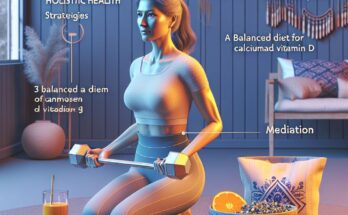Discover how acupuncture can provide effective relief from menopause symptoms in this article. Learn about the holistic benefits of this ancient therapy, including hormone balance, stress reduction, and improved well-being. Explore why acupuncture is a natural choice for managing menopause and how it can support your journey to a healthier, more balanced life.
Key Takeaways
- Acupuncture is a holistic approach that can alleviate menopause symptoms such as hot flashes and sleep disturbances.
- It works by restoring balance to the body’s natural energy flow, which can be disrupted during menopause.
- Benefits of acupuncture for menopause include improved mood, reduced stress, and better hormonal regulation.
- Choosing a qualified practitioner is essential for a safe and effective acupuncture experience.
- Results can vary, but many women report feeling relief after just a few sessions.
Why Acupuncture Could Be Your Menopause Ally
Menopause is like a journey through uncharted territory for many women. It’s filled with unexpected twists and turns, hot flashes that feel like a sudden summer heatwave, and nights where sleep seems like a distant dream. But there’s a natural navigator that can help guide you through: acupuncture. This ancient practice can be your ally, bringing relief and balance back to your life.
Understanding Menopause and Its Challenges
Menopause isn’t just a phase; it’s a significant transition in a woman’s life. Hormones like estrogen and progesterone start to fluctuate, leading to a rollercoaster of symptoms. Hot flashes, night sweats, mood swings, and sleep issues are just the tip of the iceberg. But why does this happen? It’s because these hormones aren’t just about reproduction; they influence how our bodies function day to day, from our temperature control to our emotional well-being.
When these hormone levels drop, our body’s internal thermostat goes haywire, causing those dreaded hot flashes. Our sleep cycles get disrupted, leading to insomnia or restless nights. And let’s not forget the mood swings that can make us feel like we’re on an emotional pendulum. But there’s hope on the horizon, and it doesn’t necessarily come in a pill bottle.
Exploring Acupuncture as a Natural Solution
Acupuncture is like hitting the reset button on your body’s energy system. Imagine a network of rivers flowing throughout your body. Now picture a dam blocking the water’s path. That’s what happens during menopause; the energy, or ‘qi’, gets stuck. Acupuncture inserts fine needles into specific points to remove these blockages and restore the flow. It’s like removing the dam so the rivers can run freely again, bringing a sense of harmony and relief to your body.
Supporting Hormonal Balance Naturally
One of the most compelling benefits of acupuncture for menopause is its ability to promote hormonal balance without the need for hormone replacement therapy. This is particularly important for women who are looking for a natural approach or for those who cannot take hormones due to health concerns.
The Science Behind the Needles
Acupuncture is grounded in the principles of traditional Chinese medicine, which views health as a harmonious balance between the yin and yang of the body’s life force, or Qi. When this balance is disrupted, it can lead to symptoms like those experienced during menopause.
The needles used in acupuncture are thought to stimulate the body’s healing processes. They are inserted into the skin at points that correspond to various energy pathways, known as meridians. By targeting these specific points, acupuncture can help to restore the flow of Qi, thereby improving the body’s natural balance and alleviating menopausal symptoms.
How Acupuncture Influences Menopause Symptoms
Acupuncture can have a profound effect on menopause symptoms. Research suggests that it can help reduce the frequency and severity of hot flashes, improve sleep quality, and decrease mood swings. These benefits are thought to occur because acupuncture can influence the hypothalamus, which regulates body temperature and other bodily functions, as well as release endorphins, the body’s natural painkillers, which can improve mood and reduce stress.
The Role of Qi and Meridians in Body Balance
The concept of Qi and meridians is central to understanding how acupuncture works. Qi is the vital energy that circulates through the body along pathways called meridians. During menopause, the flow of Qi can become disrupted, leading to an imbalance that manifests as various symptoms. Acupuncture aims to correct this imbalance by stimulating specific points along the meridians, thereby restoring the smooth flow of Qi and alleviating symptoms.
Personalizing Your Acupuncture Experience
Every woman’s experience with menopause is unique, and so should be her acupuncture treatment. An experienced practitioner will tailor your acupuncture sessions to address your specific symptoms and concerns. They may ask detailed questions about your health, lifestyle, and the nature of your menopausal symptoms to determine the best course of treatment for you.
Selecting the Right Points for Your Symptoms
Acupuncture points are carefully chosen based on the symptoms you are experiencing. For example, certain points may be selected to cool the body and reduce hot flashes, while others may be used to promote relaxation and improve sleep. The selection of points is a skill that comes with training and experience, emphasizing the importance of finding a knowledgeable practitioner.
Frequency of Treatments: What to Expect
The frequency and number of acupuncture treatments needed can vary widely among individuals. Some may experience relief after just a few sessions, while others may require ongoing treatment to maintain the benefits. Typically, a course of treatment might start with frequent sessions (once or twice a week) and then taper off as symptoms improve.
From Skeptic to Believer: Real Stories of Relief
Many women start acupuncture as skeptics, only to become believers when they experience the benefits firsthand. Take, for example, a recent study published in the journal ‘Menopause,’ which found that women who underwent acupuncture reported significant improvements in their quality of life, including better sleep and reduced hot flashes.
Life Before and After Acupuncture: Women’s Stories
The stories of women who have found relief through acupuncture are powerful. One woman, plagued by intense night sweats that left her sheets drenched, found that after a month of acupuncture, her sweats had diminished to the point where she could sleep through the night. Another woman reported that her mood swings had stabilized, making her daily life more manageable. For those interested in holistic approaches to menopause symptoms, holistic stress management techniques may offer additional support.
Experts Weigh In: Health Professionals’ Perspectives
Health professionals who incorporate acupuncture into their practice observe its benefits for menopausal symptoms. They note that while acupuncture is not a panacea, it can be a valuable part of a holistic approach to managing menopause. Moreover, as a therapy with few side effects, it is a safe option for many women.
Finding the Best Acupuncturist for You
It’s essential to find the right acupuncturist, someone who’s not only skilled but also someone you’re comfortable with. Look for practitioners who are licensed and have experience with menopausal symptoms. Don’t be afraid to ask questions about their training, approach, and success stories. After all, this is about your health and well-being.
Criteria for Choosing a Qualified Practitioner
When searching for an acupuncturist, consider the following criteria:
- They should be licensed and certified by a recognized acupuncture authority.
- They should have experience and positive outcomes in treating menopause-related symptoms.
- They should take the time to understand your individual health needs and tailor the treatment accordingly.
- They should practice in a clean, professional environment and follow proper safety protocols.
Preparing for Your First Session: Tips and Advice
Before your first acupuncture session, it’s helpful to know what to expect. Wear loose, comfortable clothing and eat a light meal beforehand. Be ready to discuss your medical history and menopause symptoms in detail. Most importantly, approach the session with an open mind and a willingness to embrace this ancient practice’s potential benefits.
Frequently Asked Questions
Many women have questions about acupuncture as a treatment for menopause. Here are some of the most common queries:
How soon can I expect to see results with acupuncture?
Some women feel an improvement after the first few sessions, while for others, it may take longer. It’s important to give it time and maintain regular sessions as recommended by your acupuncturist.
Is acupuncture a safe option for all women undergoing menopause?
Acupuncture is generally considered safe for most women. However, if you have certain health conditions, such as a bleeding disorder or if you’re pregnant, it’s crucial to discuss these with your healthcare provider and your acupuncturist.
Can acupuncture be combined with other menopause treatments?
Yes, acupuncture can complement other treatments, including lifestyle changes and even hormone replacement therapy, if deemed appropriate by your healthcare provider.
How does acupuncture compare to hormone replacement therapy?
Acupuncture offers a non-hormonal approach to managing menopause symptoms, which is ideal for those who prefer natural remedies or cannot use hormone therapy due to health risks.
What lifestyle changes can complement acupuncture for menopause relief?
Alongside acupuncture, consider adopting a balanced diet, regular exercise, stress-reduction techniques like yoga or meditation, and sufficient sleep to maximize the benefits and support your body through menopause.



